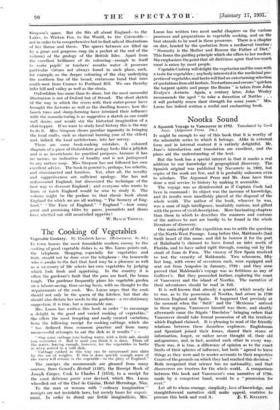Nootka Sound
A Spanish Voyage to Vancouver in 1792. Translated by Cecil Jane. (Argonaut Press. 24s.) IT might be enough to say of this book that it is worthy of the admirable series to which it belongs. Alike in external form and in internal content it is entirely delightful. Mr. Jane's introduction and translation are excellent, and the plans aid the understanding of the text.
But the book has a special interest in that it marks a real addition to our knowledge of geographical. discovery. The Spanish original was published by Navarrete in. 1802, but copies of the work are few, and it is probably unknown even to scholars. The Argonaut Press and Mr. Jane have thus done a real service to history by making it accessible.
The voyage . was as 'disinterested as if Captain Cook . had been in command : its object was the increase of knowledge, and its results were unselfishly placed at the disposal of the whole world.' The author of the book, whoever he was., was a man of high intelligence, insatiably curious, and gifted with the power of vivid description. More fascinating chapters than those hi which he describes the manners and customs of the natives he met are hardly to be found in the whole literature of discovery.
One main-object of the expedition was to settle the question of the North-West Passage. Long _before this, Maldonado (aaiil Swift heard of this name, and did he borrow it for the port of Balnibarbi ?) claimed to have found an inlet north of Florida, and to have sailed right through, coming out by the strait of Juan de Fuca. The fl viceroy of New Spain resolved to test the veracity of Maldonado. Two schooners, fifty feet long, with crews of seventeen each, were equipped and' sent out from Acapulco in January, 1792: and they soon proved that Maldonado's voyage was as fictitious as any of Gulliver's.. But they proceeded farther, exploring the coast of Vancouver and the island of Nootka. The narrative 'of their adventures should be read in full. It is well known that already a quarrel, which. nearly. led to war, as to the possession of Nootka, had arisen in 1790 between England and Spain. It happened that precisely at the moment when the Sutil ' and the Mexicana ' arrived in these regions, Vancouver himself was there, and shortly afterwards came the frigate ' Daedalus ' bringing orders that Vancouver should take formal possession of all the territory which England claimed. It is pleasing to read of the friendly relations between these dauntless explorers.' Englishman and Spaniard joined their forces,. shared their. stores of information, forgot, or *rather never thought of, their old antagonisms, and, in fact, assisted each other in every way. There was, it is true, a difference of opinion as to the exact limits of their spheres of influence, but both "agreed to leave things as they were and to render accounts to their respective Courts of the grounds on which they had reached this decision." Both recognized that science has no nationality, and that discoverers are trustees for the whole world. A comparison between this book and Vancouver's own narrative of 1798, ,made by a competent hand, would be a "possession for . ever."
Let all to whom courage, simplicity, love of knowledge, and :straightforward narrative skill make appeal, contrive to




































 Previous page
Previous page